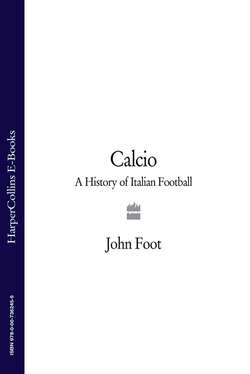Читать книгу Calcio: A History of Italian Football - John Foot - Страница 20
Amateurs and Professionals
ОглавлениеEarly Italian football, as with the game in England, was strictly an amateur sport, played for honour, fun and physical well-being, but never for money. Payment of any kind was frowned upon. Most players had other jobs – as doctors, artists, businessmen, dockers, students. Amateurism was written into the statutes and rules of clubs and players caught taking money were banned. By the 1920s, this system had become unworkable. Money was beginning to flow into the game – through gate receipts, advertising, newspapers and journalists, and prizes. Working outside of the rules the bigger clubs began to employ coaches and pay players, using a series of tricks, such as calling managers ‘consultants’. Sometimes they were caught, sometimes they weren’t. Italy was slowly catching up with England, where there were already more than 4,000 registered professional footballers by 1914.20
From 1913–1914, Genoa’s star player Renzo De Vecchi, who was known as the ‘Son of God’ because of his precocious talent, was handsomely paid for his ‘work’ as a clerk for a Genoa bank. Other sectors of De Vecchi’s pay (and transfer fee) were hidden as ‘travel expenses’. Thanks to this new job, De Vecchi’s transfer from Milan to Genoa was allowed to go ahead. In general, however, before World War One, the federation dealt harshly with those found guilty of professionalism.
When Genoa poached two players from local rivals Andrea Doria in 1913, they were caught breaking the rules.21 Offered 1,000 lire each as a signing-on fee, the players accepted, but they had the bad luck to cash their joint cheque with a bank teller who was also a disgruntled Doria fan. Upset at the loss of two excellent players, the bank clerk copied the cheque and informed the football authorities. At first, the players were banned for life, a ban that was reduced to two years on appeal and then cut further by an amnesty. Both players proved to be excellent signings, going on to win three championships with Genoa and play for Italy.
The rationale behind the amateur ideal was ideological. Sport should not be played for money, which sullied the concepts of fair play and healthy physical activity. It was a leisure activity, not a job. These lofty ideals quickly collapsed in the face of the economic needs of clubs, presidents, players and the demands of fans for success. In the 1920s a number of very high-profile big-money transfers led to bitter public discussion and in the 1926 Viareggio Charter, professionalism was officially recognized for the first time. From that point on, players’ wages (as players, not bank clerks or lawyers) were subject to negotiation and the big clubs began to buy up the best talent. And it was not just players who were on the market. The best-paid football employees never took to the pitch themselves, but selected and trained their teams: the managers.
